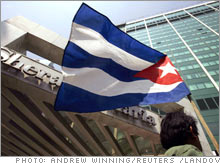No hospitality for Cubans at Hilton hotelsThe U.S. government is cracking down on enforcing the Cuban embargo, and American businesses overseas are paying the price, says Fortune's Eliza Barclay.(Fortune Magazine) -- When a delegation of 14 Cubans tried to stay at their usual hotel in Oslo for a travel fair in January, they found themselves bounced from the reservations roster. It turns out the Scandic Edderkoppen Hotel had been acquired last spring by the Hilton chain, which is forbidden by the U.S. embargo from hosting Cuban guests - even in Norway. Norwegian activists called it discrimination and threatened suit; others called for a boycott of the entire 140-hotel Scandic chain.
Hilton acted preemptively without a directive from Washington, D.C. But the fear of a phone call and a fine from the U.S. Treasury Department's Office of Foreign Assets Control (OFAC) is enough to keep businesses dealing with Cubans on vigilant watch. That's because OFAC has been cracking down in line with the Bush administration's tightened policy against Cuba since 2003 - the relinquishing of power by the ailing Fidel Castro last year notwithstanding. Under the Trading With the Enemy Act, U.S. businesses and subsidiaries are prohibited from providing services to Cubans - a provision more restrictive than for other sanctioned countries, including Iran and North Korea. "Various measures under the Cuban sanctions have been strengthened under the Bush administration," says OFAC spokeswoman Molly Millerwise. In December, OFAC fined Oliver Stone's production company, Ixtlan Corp., $6,322 for filming the documentary Comandante, about Fidel Castro, in Cuba. And OFAC now scrutinizes the rare licenses granted for travel to Cuba. Until 2003, Americans could skirt restrictions by touring with organized cultural or "religious" groups. "OFAC wants to send a message: Trade with Cuba is still prohibited," says Douglas Jacobson, a sanctions and export-control attorney with Strasburger & Price in Washington, D.C. OFAC also may have scared away foreign banks from Cuba, says Kirby Jones, who heads the U.S.-Cuba Trade Association. The euro and British pound have replaced the U.S. dollar in most transactions with Cuba because of pressure from OFAC, the group wrote in a recent newsletter. "OFAC has been very aggressive in trying to intimidate foreign banks," says Jones. "Some have closed down as a result." The banks don't point at OFAC specifically, but sanctions make the banking business slow and difficult. Deutsche Bank (Charts) and HSBC (Charts) terminated transactions with Cuba-based clients in 2005 and 2006. UBS (Charts) was the latest to pull out, in November. "Doing business there was not paying out," says UBS spokesman Serge Steiner in Zurich. "The risks are obviously huge." There's fear in the hotel industry too. Last year the Sheraton Maria Isabel Hotel in Mexico City was to have hosted 16 Cubans at a conference, but OFAC intervened. After the Sheraton banned the Cubans, Mexican authorities fumed over what they called a breach of sovereignty and fined the Sheraton $112,000. Hilton didn't want to take chances with OFAC. "It's a difficult situation for us," says Mark Grossman, vice president for corporate affairs for Hilton Hotels (Charts), headquartered in Beverly Hills. "Our stance is that we don't discriminate among guests, but we have to adhere to U.S. laws." Hilton is in discussion with Norwegian authorities to avoid being fined under antidiscrimination laws. With the new Congress, some are optimistic. Says attorney Wynn Segall of the firm Akin Gump: "There is a growing bipartisan consensus of support for reform and easing of the embargo." But the President still has the veto. ______________________ |
Sponsors
|

